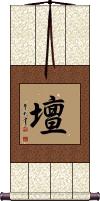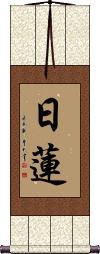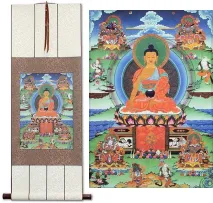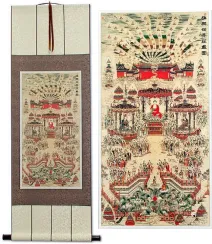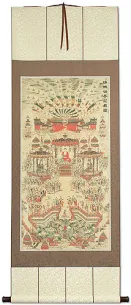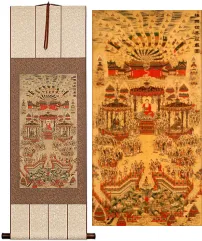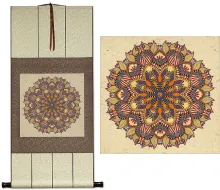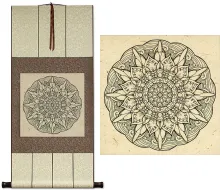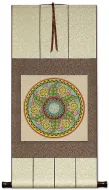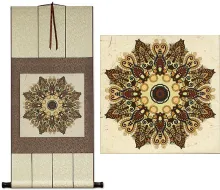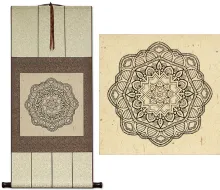Many custom options...
And formats...

Mandala Altar in Chinese / Japanese...
Buy a Mandala Altar calligraphy wall scroll here!
Personalize your custom “Mandala Altar” project by clicking the button next to your favorite “Mandala Altar” title below...
Mandala / Altar
壇 is the Chinese, Japanese Kanji, and old Korean Hanja for mandala or altar.
This can also mean platform, podium, rostrum, or “objects of worship grouped together.”
In Japanese, this can be the given name Mayumi.
Nichiren
日蓮 is the title Nichiren.
This title refers to a Buddhist priest who lived from 1222 to 1282. He is the founder of the Nichiren sect of Buddhism.
According to historical documents, the Nichiren sect was established in 1252. Adding the character 宗 for sect, this would be 日蓮宗 (Nichiren sect), which is also known as the 法華宗 or Lotus sect.
According to Soothill-Hodous...
Nichiren's chief tenets are the three great mysteries 三大祕法, representing the trikāya:
1. 本尊 or chief object of worship, being the great maṇḍala of the worlds of the ten directions, or universe, i.e., the body or nirmāṇakāya of Buddha.
2. 題目 the title of the Lotus Sutra 妙法蓮華經 Myo-ho-ren-ge-kyo, preceded by Namo, or “Adoration to the scripture of the lotus of the wonderful law,” for it is Buddha's spiritual body.
3. 戒壇 the altar of the law, which is also the title of the Lotus as above; the believer, wherever he is, dwells in the Pure-land of calm light 寂光淨土, the saṃbhogakāya.
This in-stock artwork might be what you are looking for, and ships right away...
Gallery Price: $200.00
Your Price: $88.88
Gallery Price: $108.00
Your Price: $59.88
Gallery Price: $96.00
Your Price: $52.88
Gallery Price: $90.00
Your Price: $49.88
Gallery Price: $63.00
Your Price: $34.88
Gallery Price: $72.00
Your Price: $39.88
Gallery Price: $63.00
Your Price: $34.88
Gallery Price: $72.00
Your Price: $39.88
Gallery Price: $70.00
Your Price: $38.88
Not the results for mandala altar that you were looking for?
Below are some entries from our dictionary that may match your mandala altar search...
| Characters If shown, 2nd row is Simp. Chinese |
Pronunciation Romanization |
Simple Dictionary Definition |
壇 坛 see styles |
tán tan2 t`an tan mayumi まゆみ |
More info & calligraphy: Mandala / Altar(1) platform; podium; rostrum; pulpit; (2) (ceremonial) mound; (suffix noun) (3) world (of haiku, art, etc.); (literary) circles; (4) (archaism) mandala; (given name) Mayumi An altar; an open altar. In the esoteric cult it also means a maṇḍala, objects of worship grouped together. |
日蓮 日莲 see styles |
rì lián ri4 lian2 jih lien nichiren にちれん |
More info & calligraphy: NichirenNichiren, the Japanese founder, in A. D. 1252, of the 日蓮宗 Nichiren sect, which is also known as the 法華宗 or Lotus sect. Its chief tenets are the three great mysteries 三大祕法, representing the trikāya: (1) 本尊 or chief object of worship, being the great maṇḍala of the worlds of the ten directions, or universe, i. e. the body or nirmāṇakāya of Buddha; (2) 題目 the title of the Lotus Sutra 妙法蓮華經 Myo-ho-ren-gwe-kyo, preceded by Namo, or, 'Adoration to the scripture of the lotus of the wonderful law, ' for it is Buddha's spiritual body; (3) 戒壇 the altar of the law, which is also the title of the Lotus as above; the believer, wherever he is, dwells in the Pure-land of calm light 寂光淨土, the saṃbhogakāya. |
圓壇 圆坛 see styles |
yuán tán yuan2 tan2 yüan t`an yüan tan endan |
Round altar; a complete group of objects of worship, a maṇḍala. |
大宝 see styles |
daihou / daiho だいほう |
(1) great treasure; (2) (hist) Taihō era (701.3.21-704.5.10); Daihō era; (3) (rare) {Buddh} great treasure (used to refer to bodhisattvas, esoteric teachings, etc.); (4) (rare) {Buddh} (See 護摩壇) homa-mandala (fire altar); (place-name) Daihou |
大悲壇 大悲坛 see styles |
dà bēi tán da4 bei1 tan2 ta pei t`an ta pei tan daihi dan |
The altar of pity, a term for the garbhadhātu maṇḍala , or for the Sakyamumi group. |
曼荼羅 曼荼罗 see styles |
màn tú luó man4 tu2 luo2 man t`u lo man tu lo mandara まんだら |
(Buddhism) (loanword from Sanskrit) mandala mandala; Buddhist visual schema of the enlightened mind; (given name) Mandara 曼怛羅; 曼特羅; 曼陀羅; 曼拏羅; 蔓陀囉; 滿荼邏 maṇḍala, a circle, globe, wheel ring; "any circular figure or diagram" (M.W.); a magic circle; a plot or place of enlightenment; a round or square altar on which buddhas and bodhisattvas are placed; a group of such, especially the garbhadhātu and vajradhātu groups of the Shingon sect; these were arranged by Kōbō Daishi to express the mystic doctrine of the two dhātu by way of illustration, the garbhadhātu representing the 理 and the 因 principle and cause, the vajradhātu the 智 and the 果 intelligence (or reason) and the effect, i.e. the fundamental realm of being, and mind as inherent in it; v. 胎 and 金剛. The two realms are fundamentally one, as are the absolute and phenomenal, e.g. water and wave. There are many kinds of maṇḍalas, e.g. the group of the Lotus Sutra; of the 觀經; of the nine luminaries; of the Buddha's entering into nirvana, etc. The real purpose of a maṇḍala is to gather the spiritual powers together, in order to promote the operation of the dharma or law. The term is commonly applied to a magic circle, subdivided into circles or squares in which are painted Buddhist divinities and symbols. Maṇḍalas also reveal the direct retribution of each of the ten worlds of beings (purgatory, pretas, animals, asuras, men, devas, the heavens of form, formless heavens, bodhisattvas, and buddhas). Each world has its maṇḍala which represents the originating principle that brings it to completion. The maṇḍala of the tenth world indicates the fulfilment and completion of the nine worlds. |
護摩壇 护摩坛 see styles |
hù mó tán hu4 mo2 tan2 hu mo t`an hu mo tan gomadan ごまだん |
{Buddh} (See 護摩) homa-mandala (fire altar); (place-name) Gomadan a fire-altar |
五種壇法 五种坛法 see styles |
wǔ zhǒng tán fǎ wu3 zhong3 tan2 fa3 wu chung t`an fa wu chung tan fa goshu danpō |
The five kinds of maṇḍala ceremonials, v. 五部尊法. |
The following table may be helpful for those studying Chinese or Japanese...
| Title | Characters | Romaji (Romanized Japanese) | Various forms of Romanized Chinese | |
| Mandala Altar | 壇 坛 | dan | tán / tan2 / tan | t`an / tan |
| Nichiren | 日蓮 日莲 | nichi ren / nichiren | rì lián / ri4 lian2 / ri lian / rilian | jih lien / jihlien |
| In some entries above you will see that characters have different versions above and below a line. In these cases, the characters above the line are Traditional Chinese, while the ones below are Simplified Chinese. | ||||
Successful Chinese Character and Japanese Kanji calligraphy searches within the last few hours...
